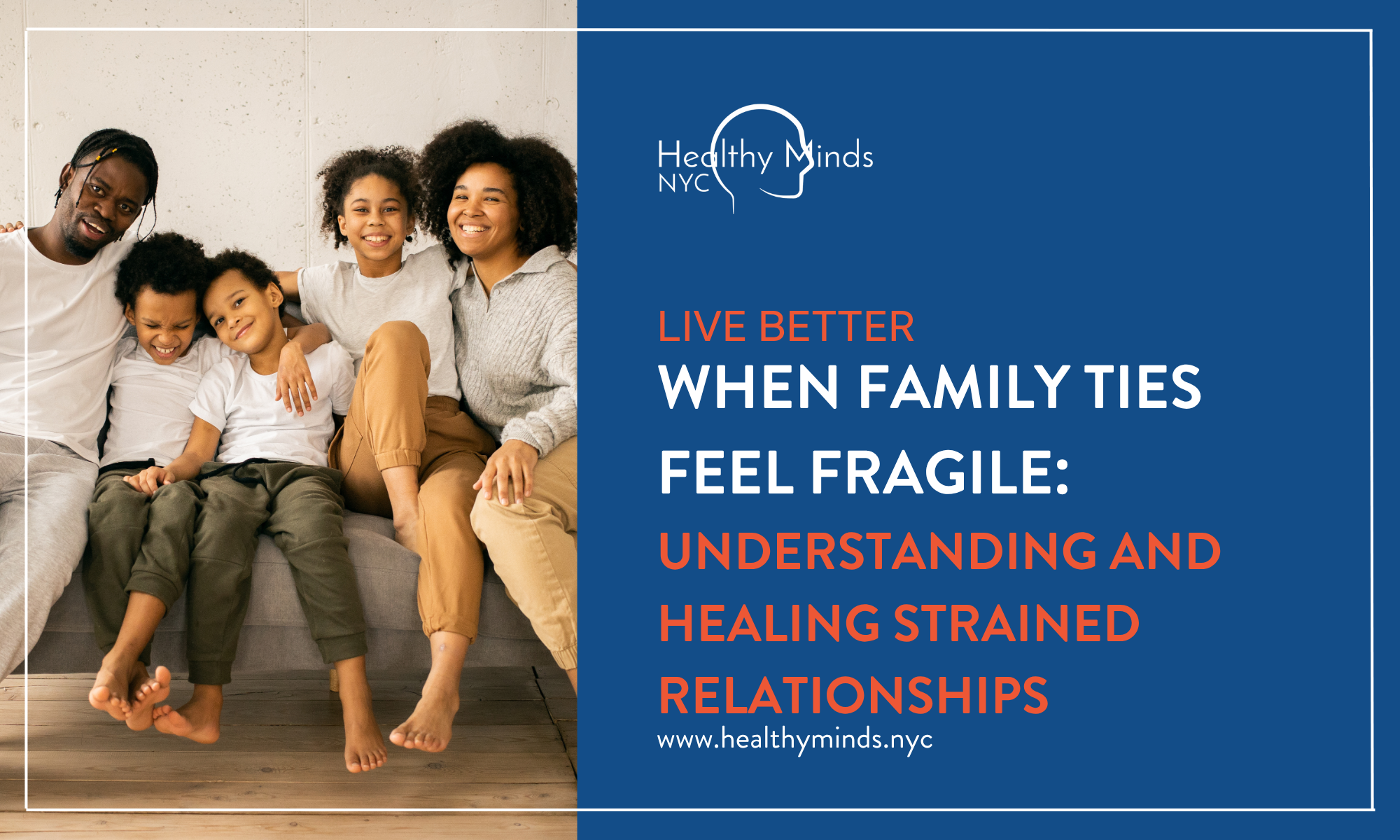When Family Ties Feel Fragile: Understanding and Healing Strained Relationships
Family relationships are often described as unbreakable. But in reality, even the strongest family bonds can experience strain. Misunderstandings, unspoken expectations, emotional distance, or past pain can all chip away at the connection you once had with a parent, sibling, or child.
If you're feeling a growing tension or emotional discomfort when you're around a family member—or even avoiding them altogether—you may be navigating a strained family relationship. The good news is: strained doesn’t have to mean broken. With the right tools and mindset, healing is possible.
What Is a Strained Relationship with Family?
A strained family relationship is one marked by consistent emotional tension, miscommunication, or unresolved conflict. It can stem from something as subtle as mismatched expectations or as significant as betrayal, trauma, or years of built-up resentment.
You might be dealing with a strained family relationship if:
Conversations often turn into arguments or end with one person shutting down.
You feel anxious, uncomfortable, or emotionally drained after spending time with them.
There’s a long history of unresolved issues that no one talks about.
You feel unsupported or judged, even when you try to be vulnerable.
You’re constantly walking on eggshells to avoid conflict.
Strain doesn’t always show up as yelling or confrontation—it can also look like silence, avoidance, or emotional distance.
Common Causes of Strain in Family Relationships
Family dynamics are layered. Sometimes, the source of tension goes back years—or even generations. Some of the most common causes include:
Unspoken Expectations: Different values or assumptions about how family members should behave.
Poor Communication: Misunderstandings that snowball over time.
Old Wounds: Childhood experiences or unresolved past trauma.
Changing Roles: Shifts in family structure (e.g., caregiving, divorce, aging parents) can create tension.
Boundaries Being Crossed: Repeated disregard for emotional or physical boundaries.
Understanding what’s driving the strain doesn’t excuse harmful behavior—but it does give you a starting point for healing.
How to Begin Healing a Strained Family Relationship
Rebuilding a relationship with a family member is rarely quick or easy, but it is possible. Here’s where to start:
1. Reflect Before Reaching Out
Before trying to "fix" things, take time to explore your own feelings. What hurts? What are you hoping for? Are you ready to reconnect—or do you need to set firmer boundaries?
2. Communicate With Clarity and Compassion
If you're ready to open the door to reconnection, start with honesty. Choose a calm moment to share your feelings without blame. Use “I” statements to express your experience rather than pointing fingers.
Example: “I’ve been feeling distant lately and I miss how close we used to be. I’d like to understand what’s been happening between us.”
3. Validate Each Other’s Experiences
Listening is just as important as speaking. Acknowledge their perspective, even if you disagree. Validation doesn’t mean agreeing—it means recognizing their emotions as real and valid.
4. Apologize (When It’s Needed)
A sincere apology can be incredibly healing. If you know you’ve hurt someone, own it—without defensiveness or excuses. And if you’re the one carrying hurt, be open to forgiveness if it feels safe.
5. Establish Healthy Boundaries
Sometimes strain comes from too much closeness or too little space. Setting boundaries isn’t about pushing someone away—it’s about creating a structure where the relationship can thrive.
6. Seek Outside Support
If conversations are too emotional or feel stuck, a therapist or family counselor can help. Professional guidance offers tools to break through communication blocks and build mutual understanding.
When Reconciliation Isn’t Possible
While many family relationships can be repaired, not all should be. If your family dynamic includes ongoing emotional abuse, manipulation, or harm, it may be healthier to step away—or redefine the relationship entirely.
Choosing distance doesn’t make you a bad family member. It makes you someone who’s protecting your peace. Healing can still happen, even from afar.
Final Thoughts: Strain Doesn’t Have to Be the End of the Story
Strained family relationships can feel heavy—but they don’t have to last forever. With reflection, boundaries, and intentional effort, many family bonds can be repaired and even strengthened. And when healing together isn’t possible, choosing healing for yourself is just as meaningful.
If you’re ready to begin the process of repair—or simply need space to explore what’s next—Healthy Minds NYC is here to support you. Our compassionate therapists can help you process past wounds, set boundaries, and work toward stronger, healthier relationships.
You don’t have to navigate strained family dynamics alone.
What is a strained family relationship?
A strained family relationship is one marked by ongoing tension, distance, or conflict between relatives. This could involve poor communication, unresolved arguments, hurt feelings, or lack of trust. These relationships often feel emotionally exhausting or uncomfortable.
Frequently Asked Question’s:
What does "strained relationship" mean?
A strained relationship refers to any connection—family, romantic, friendship, or work-related—that is under stress or tension. It usually involves difficulty in communication, frequent misunderstandings, or emotional disconnect.
How to fix a broken relationship with family?
Open Communication – Be honest but respectful about how you feel. Let the other person share, too.
Take Responsibility – Acknowledge your part in the conflict without placing full blame.
Set Boundaries – Be clear about what you can and cannot accept moving forward.
Seek Understanding – Try to view the situation from their perspective.
Get Help if Needed – Family therapy or a mediator can help guide tough conversations.
Be Patient – Healing takes time. Don’t rush the process.
How to deal with strained family relationships?
Accept Reality – Not all relationships will be close or perfect.
Focus on Self-Care – Prioritize your emotional well-being.
Limit Contact if Necessary – Protect yourself from ongoing harm.
Practice Forgiveness – For your own peace, even if reconciliation isn’t possible.
Communicate Clearly – Speak your truth without aggression.

